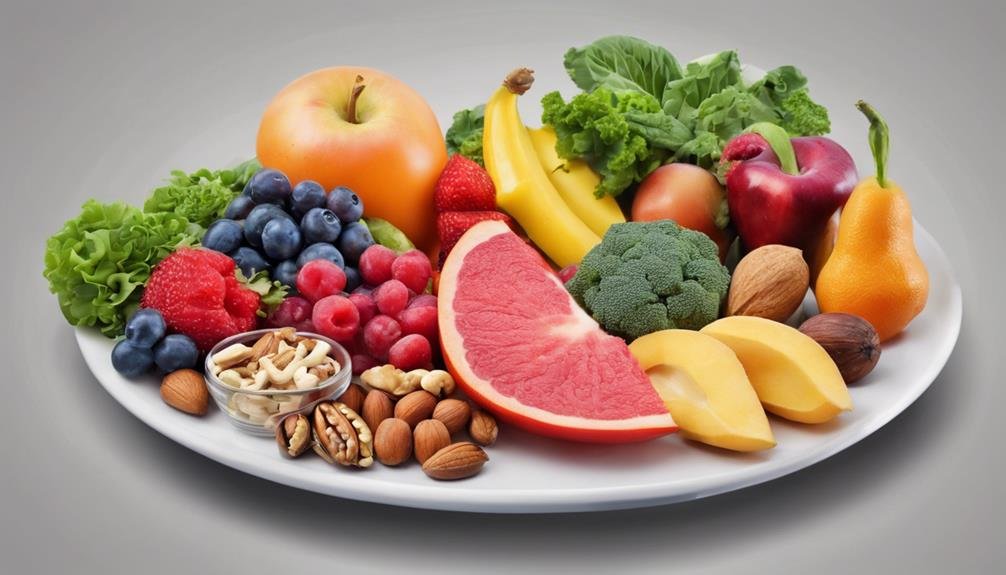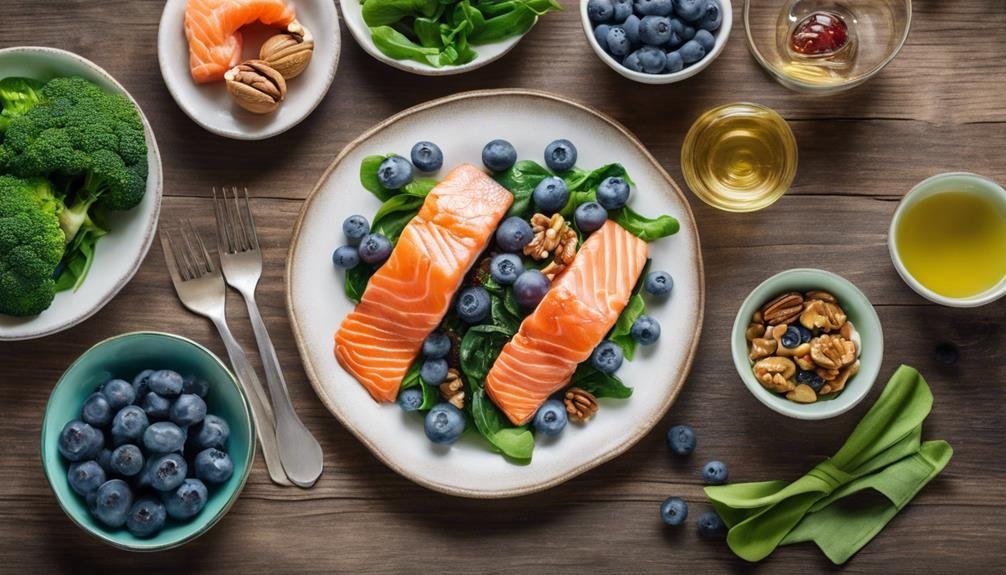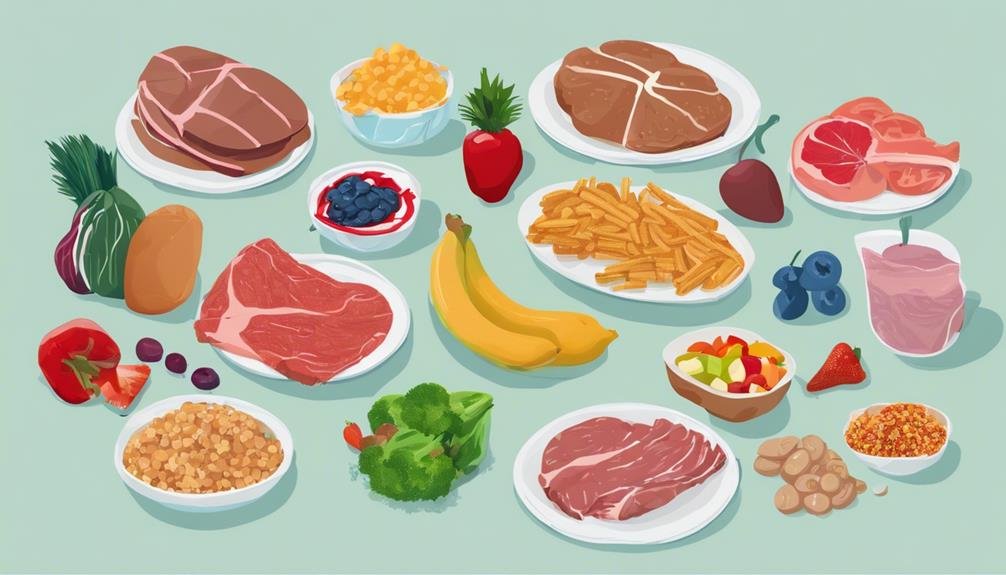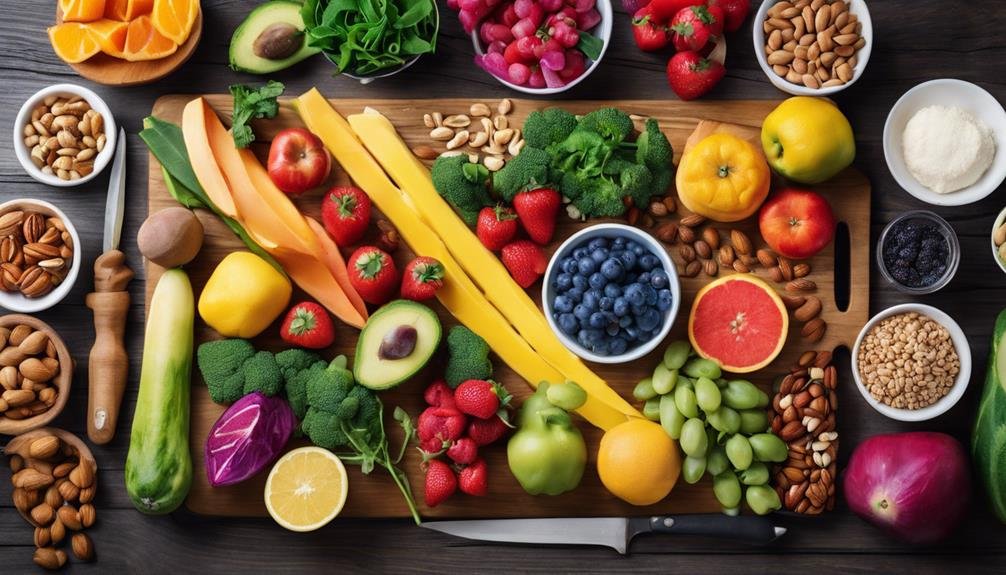Have you ever wondered if the Paleo diet can truly impact cancer outcomes? Consider this – Sarah, a breast cancer survivor, credits the Paleo diet for boosting her energy levels during chemotherapy. However, the question remains: can this popular diet really make a difference in cancer prevention and treatment? Join us as we explore the evidence behind the Paleo diet's potential effects on cancer, separating myths from facts to help you make informed decisions about your health.
Evolution of Paleo Diet
The evolution of the Paleo diet can be traced back to the early 20th century when researchers and nutritionists began to explore the dietary habits of our ancient ancestors. Inspired by the way early humans ate before the agricultural revolution, the Paleo diet focuses on consuming whole foods such as lean meats, fish, fruits, vegetables, nuts, and seeds while avoiding processed foods, grains, dairy, and sugars. This dietary approach aims to mimic the nutritional intake of our Paleolithic ancestors, emphasizing nutrient-dense, unprocessed foods.
Research suggests that the Paleo diet may offer benefits such as weight loss, improved blood sugar control, and reduced inflammation. By prioritizing whole foods rich in vitamins, minerals, and antioxidants, adherents of the Paleo diet aim to support overall health and well-being. While individual responses to the diet may vary, many people report feeling more energetic and experiencing better digestion when following the principles of the Paleo diet.
As with any dietary approach, it's essential to consult with a healthcare provider or nutritionist to ensure that individual nutritional needs are being met.
Cancer Development Mechanisms
Exploring the intricate mechanisms behind cancer development unveils a complex interplay of genetic mutations, environmental factors, and cellular processes. Understanding these mechanisms is crucial in the fight against cancer. Here are three key points to consider:
- Genetic Mutations: Mutations in genes can disrupt the normal control of cell growth and division, leading to uncontrolled cell proliferation and tumor formation.
- Environmental Factors: Exposure to carcinogens like tobacco smoke, ultraviolet radiation, and certain chemicals can damage DNA and increase the risk of developing cancer.
- Cellular Processes: Abnormalities in cellular processes such as apoptosis (cell death), DNA repair, and angiogenesis (formation of new blood vessels) can contribute to tumor growth and progression.
Impact on Inflammation
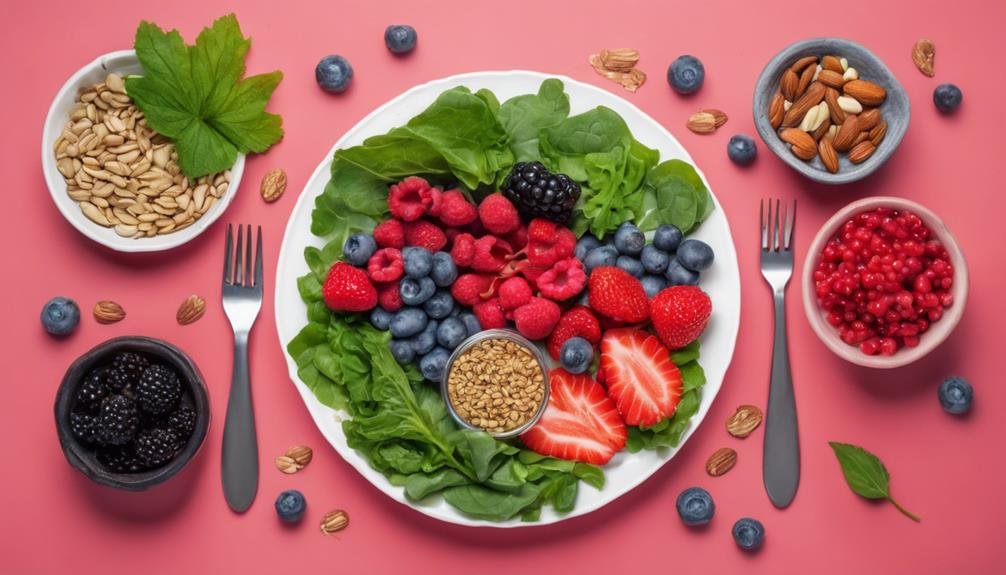
Inflammation plays a critical role in the development and progression of cancer. Chronic inflammation can create a microenvironment that promotes cancer cell growth, invasion, and metastasis. The Paleo diet, rich in fruits, vegetables, lean meats, nuts, and seeds, has been associated with reduced inflammation levels in the body. By avoiding processed foods, refined sugars, and trans fats, which are known to trigger inflammation, the Paleo diet can help regulate the body's inflammatory responses.
Studies have shown that adhering to a Paleo diet may lead to a decrease in inflammatory markers such as C-reactive protein (CRP) and interleukin-6 (IL-6). These markers are often elevated in individuals with chronic inflammation and are linked to an increased risk of cancer development.
Nutrient Density in Paleo Diet
With a focus on whole foods like lean meats, seafood, fruits, and vegetables, the Paleo diet is known for its nutrient-dense nature. This means that by following the Paleo diet, you're providing your body with a wide range of essential nutrients that are crucial for overall health and well-being.
Here are three key points about the nutrient density of the Paleo diet:
- Rich in Vitamins and Minerals: Lean meats and seafood are excellent sources of essential vitamins such as B vitamins and minerals like iron and zinc, which are vital for various bodily functions.
- High in Antioxidants: Fruits and vegetables included in the Paleo diet are packed with antioxidants like vitamin C, vitamin E, and beta-carotene, which help protect your cells from damage caused by free radicals.
- Healthy Fats: The inclusion of healthy fats from sources like nuts, seeds, and olive oil in the Paleo diet provides essential fatty acids that support brain function, hormone production, and overall health.
Role of Macronutrients
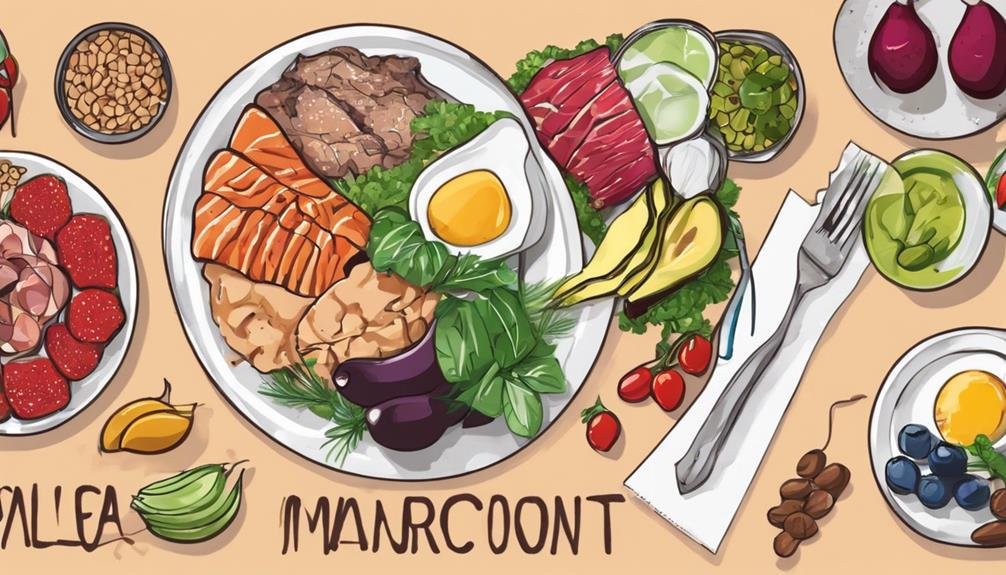
The role of macronutrients in the Paleo diet is crucial for providing the necessary energy and building blocks for the body to function optimally. Proteins, fats, and carbohydrates are the three main macronutrients that play essential roles in various bodily functions.
Proteins are important for tissue repair and muscle development. In the Paleo diet, lean proteins from sources like grass-fed meat, fish, and eggs are favored.
Fats are vital for hormone production, cell structure, and energy storage. Healthy fats such as those found in avocados, nuts, and olive oil are staples in the Paleo diet.
Carbohydrates, primarily sourced from fruits and vegetables, provide energy for daily activities and brain function.
Balancing macronutrients in the Paleo diet can help regulate blood sugar levels, support weight management, and enhance overall health. By focusing on high-quality sources of proteins, fats, and carbohydrates, you can optimize your nutrient intake and support your body's functions effectively.
Antioxidants and Cancer Risk
Rich in colorful fruits and vegetables, the Paleo diet offers a wealth of antioxidants that play a crucial role in reducing cancer risk. Antioxidants are compounds that help protect your cells from damage caused by free radicals, unstable molecules that can lead to oxidative stress and potentially increase cancer risk.
Here are three ways antioxidants in the Paleo diet can help lower your cancer risk:
- Neutralizing Free Radicals: Antioxidants like vitamin C, vitamin E, and beta-carotene found in Paleo-friendly foods can help neutralize free radicals, preventing them from causing cellular damage.
- Reducing Inflammation: Many antioxidants in the Paleo diet have anti-inflammatory properties, which can help reduce chronic inflammation, a known risk factor for cancer development.
- Supporting DNA Repair: Some antioxidants support DNA repair mechanisms, helping to maintain the integrity of your genetic material and reduce the chances of mutations that could lead to cancer.
Gut Microbiome Influence
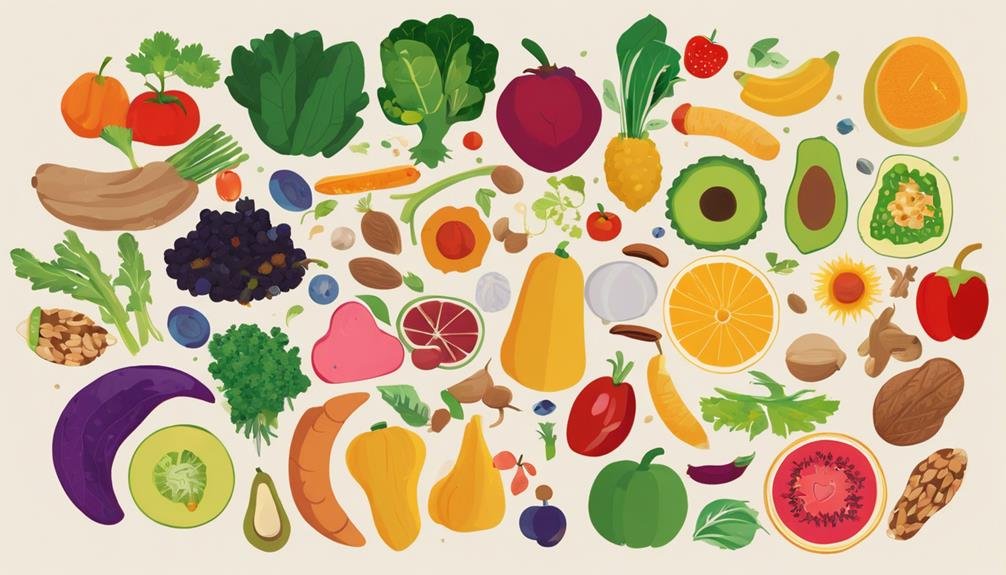
A diverse and balanced gut microbiome plays a critical role in influencing various aspects of human health, including immune function, metabolism, and even cancer risk. The trillions of microorganisms residing in your gut interact with your body in complex ways, impacting inflammation levels and nutrient absorption. Research suggests that an imbalance in the gut microbiome, known as dysbiosis, may contribute to the development of certain types of cancer.
Healthy gut bacteria can help regulate your immune system, reducing inflammation and supporting a strong defense against cancerous cells. They also play a role in metabolizing dietary components, influencing how your body processes food and potentially affecting cancer risk.
Insulin Sensitivity and Cancer
Dietary factors can significantly impact insulin sensitivity, a crucial aspect of metabolic health that plays a role in the development and progression of cancer. Maintaining proper insulin levels is essential for overall health, especially in the context of cancer prevention. Here are three key points to consider:
- Insulin Resistance: High insulin levels resulting from insulin resistance can promote cancer growth by providing excess energy to cancer cells and stimulating their proliferation.
- Inflammation: Insulin resistance often leads to chronic inflammation, creating a favorable environment for cancer development and progression.
- Hormone Regulation: Insulin plays a role in regulating other hormones, such as insulin-like growth factor 1 (IGF-1), which can influence cancer cell growth and survival.
Potential Toxicity Concerns
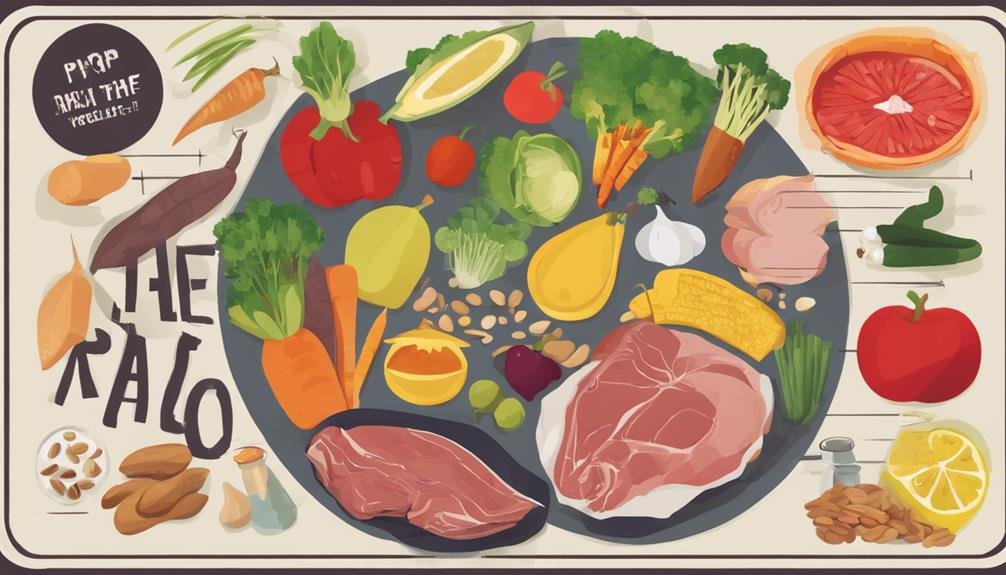
Exposure to potentially toxic compounds through dietary sources is a subject of concern when evaluating the overall impact of a diet on health outcomes. In the context of the Paleo diet, certain aspects raise potential toxicity concerns.
One consideration is the consumption of organ meats, which are nutrient-dense but can also contain high levels of certain fat-soluble vitamins and heavy metals like lead and cadmium. While these nutrients are essential in moderate amounts, excessive intake could lead to toxicity over time.
Another aspect to be mindful of is the reliance on red meat in the Paleo diet. High consumption of red meat has been associated with an increased risk of certain cancers, mainly colorectal cancer. Additionally, the emphasis on consuming large quantities of processed meats like bacon and sausage can introduce harmful compounds such as nitrates and nitrites, which are known carcinogens.
Being aware of these potential toxicity concerns can help individuals make informed decisions when following a Paleo diet to mitigate any adverse health effects.
Clinical Evidence and Studies
Clinical evidence and studies provide valuable insights into the impact of the Paleo diet on cancer risk and progression. Research in this area has yielded promising results, shedding light on the potential benefits of following a Paleo diet in cancer management.
Here are three key findings from clinical studies:
- Tumor Reduction: Some studies suggest that adhering to a Paleo diet rich in fruits, vegetables, lean meats, and healthy fats may lead to a reduction in tumor size in certain types of cancer.
- Inflammation Control: The anti-inflammatory properties of the Paleo diet have been linked to decreased inflammation levels, which could play a role in slowing cancer progression and improving treatment outcomes.
- Improved Metabolic Health: Research indicates that the Paleo diet's focus on whole foods and elimination of processed ingredients may help regulate blood sugar levels and improve metabolic health, factors that are crucial in cancer prevention and management.
These findings underscore the potential of the Paleo diet as a complementary approach in the fight against cancer, warranting further investigation and consideration by both patients and healthcare providers.
Paleo Diet in Cancer Prevention
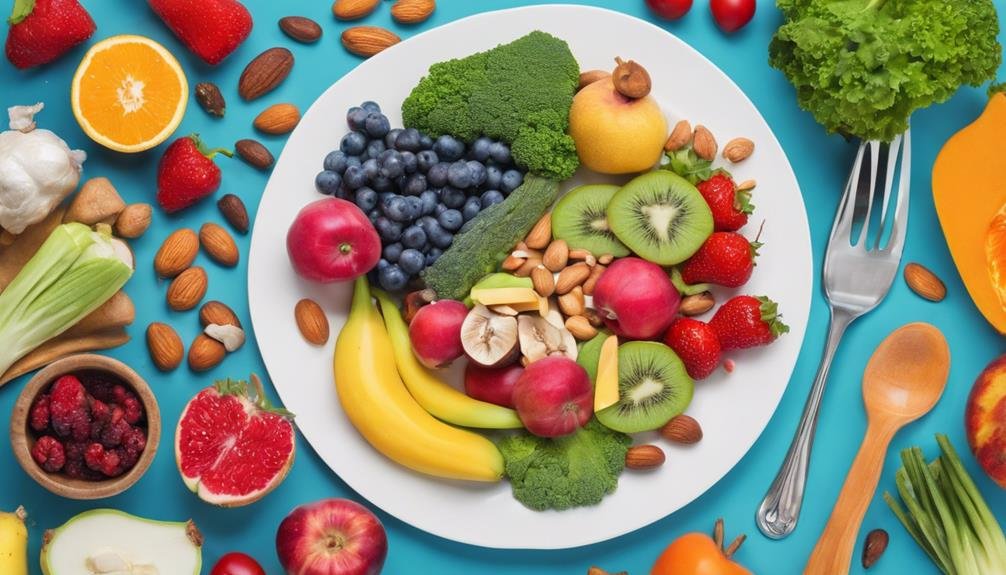
When considering cancer prevention, adopting a dietary approach like the Paleo diet can offer a promising avenue for reducing risk factors and promoting overall health. The Paleo diet emphasizes whole foods such as lean proteins, fruits, vegetables, nuts, and seeds while excluding processed foods, sugars, and grains. These dietary choices may help reduce inflammation, support a healthy weight, and provide essential nutrients that are beneficial for cancer prevention.
Research suggests that certain components of the Paleo diet, such as high fiber intake from fruits and vegetables, omega-3 fatty acids from fish, and antioxidants from colorful produce, may play a role in reducing the risk of developing certain types of cancer. Additionally, the avoidance of processed meats and sugars aligns with recommendations to decrease the intake of known carcinogens and promoters of cancer growth.
Incorporating a Paleo diet rich in nutrient-dense foods and free from harmful additives may contribute to a lifestyle that supports overall health and potentially reduces the risk of cancer development.
Integrating With Cancer Treatment
Integrating the Paleo diet with cancer treatment can present potential benefits in supporting overall health and well-being during the course of medical interventions. When considering this approach, it's essential to understand the impact it may have on your journey through cancer treatment. Here are some key points to consider:
- Nutrient-Dense Foods: The Paleo diet emphasizes whole foods like fruits, vegetables, lean proteins, and healthy fats, providing essential nutrients that support your body's immune system and overall health during cancer treatment.
- Reduced Inflammation: By avoiding processed foods, sugars, and grains, the Paleo diet may help reduce inflammation in the body, which is crucial for managing side effects of cancer treatment and promoting healing.
- Stable Blood Sugar Levels: The balanced intake of protein, fats, and carbohydrates in the Paleo diet can help regulate blood sugar levels, which is important for managing energy levels and supporting overall well-being as you undergo cancer treatment.
Integrating the Paleo diet thoughtfully into your cancer treatment plan may offer additional support for your health and well-being during this challenging time.
Frequently Asked Questions
Can the Paleo Diet Cure Cancer?
The Paleo diet isn't a proven cure for cancer. While a healthy diet can support overall well-being, it's essential to rely on evidence-based treatments for cancer. Consult healthcare professionals for personalized advice and treatment plans.
Emphasize a balanced diet, exercise, and medical interventions for managing cancer effectively. Remember, seeking guidance from medical experts is crucial in dealing with serious health conditions like cancer.
Is It Safe to Follow the Paleo Diet During Chemotherapy?
Following the Paleo diet during chemotherapy can be safe, but it's crucial to consult with your healthcare provider. Chemotherapy can impact your appetite and nutritional needs, so it's important to ensure you're getting the right nutrients to support your body during treatment.
The Paleo diet, rich in whole foods like fruits, vegetables, lean proteins, and healthy fats, can provide essential nutrients and support your overall health during chemotherapy.
Are There Any Specific Paleo Recipes for Cancer Patients?
When looking for specific paleo recipes tailored for cancer patients, seek dishes rich in anti-inflammatory foods like leafy greens, berries, and oily fish. Incorporating turmeric, garlic, and ginger can also provide additional benefits. Remember, consulting a healthcare professional before making significant dietary changes is crucial. By focusing on nutrient-dense, whole foods, you can provide your body with the support it needs during this challenging time.
Can the Paleo Diet Prevent All Types of Cancer?
While the Paleo diet emphasizes whole foods and limits processed items, it isn't a guaranteed method to prevent all types of cancer. Research suggests that this diet may reduce inflammation and improve overall health, which could potentially lower cancer risk.
How Does the Paleo Diet Impact Cancer Survivors' Health?
The Paleo diet can positively impact cancer survivors' health by promoting a nutrient-dense, anti-inflammatory eating pattern. By emphasizing whole foods like lean proteins, fruits, vegetables, and healthy fats, this diet can support overall well-being and aid in managing side effects of cancer treatment.
Additionally, the Paleo diet's focus on reducing processed foods and sugar may help improve energy levels and support immune function, crucial for cancer survivors' recovery.
Conclusion
So, there you have it – the Paleo diet and cancer, a mix of myths and facts. Remember, while the Paleo diet may offer potential benefits for cancer prevention, it's essential to consider all aspects, including nutrient density, inflammation levels, and potential toxicity concerns. Keep exploring the evidence and stay informed. Who knows, maybe that juicy steak might just be the key to fighting cancer after all!
